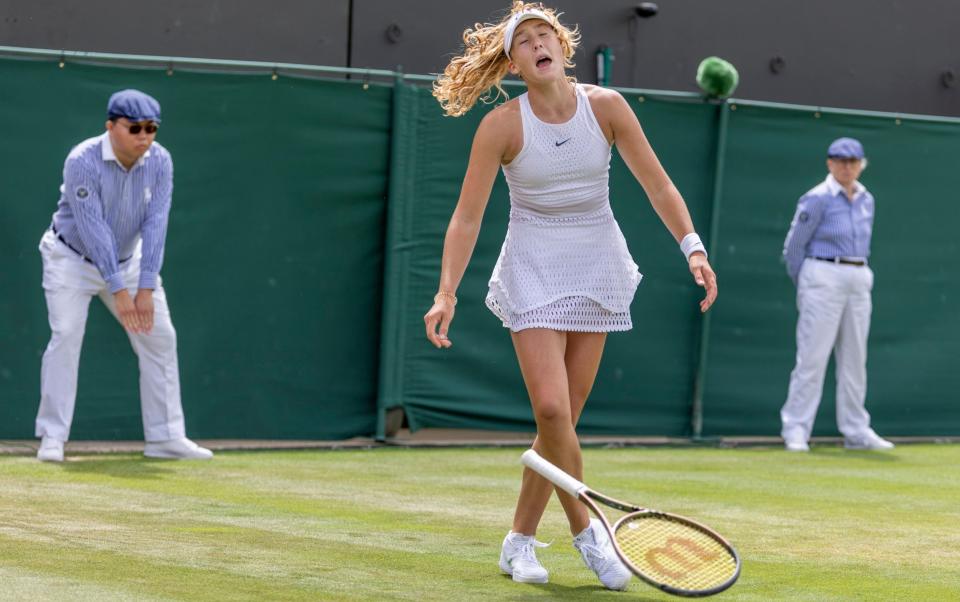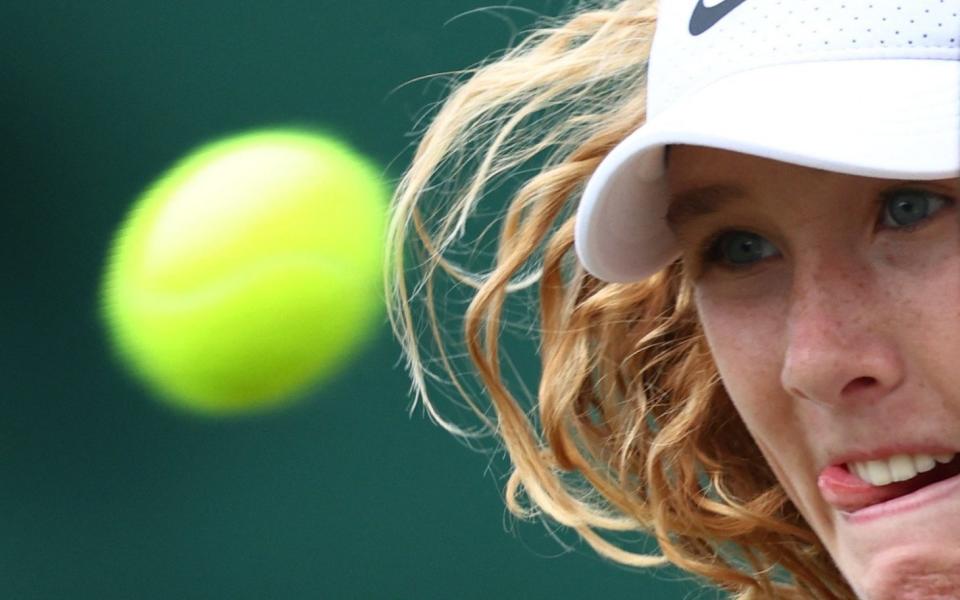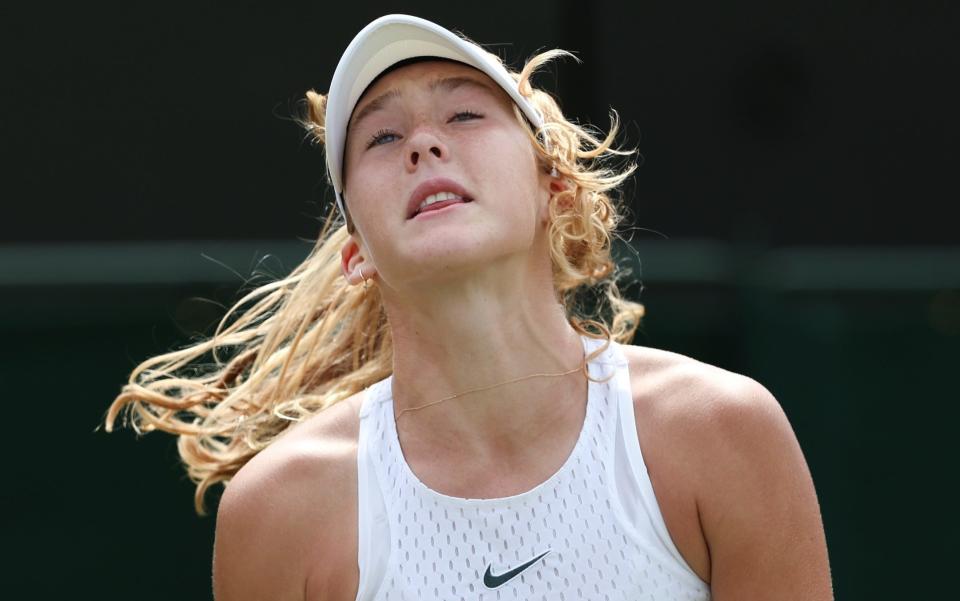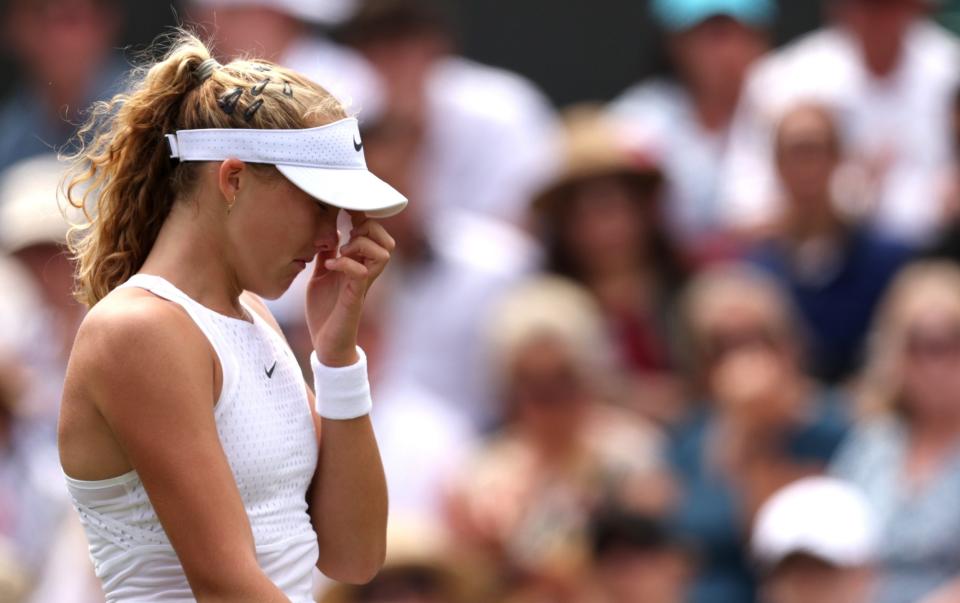Russian 16-year-old Mirra Andreeva slams umpire after furious on-court row over ‘slip’

Mirra Andreeva claimed that she was wrongly docked a point after her dream of becoming the youngest Wimbledon quarter-finalist this century ended with her storming off court and refusing to shake the umpire’s hand.
The 16-year-old Russian had enthralled the Wimbledon crowd in surging to a 6-3, 4-1 lead but faltered after Madison Keys began volleying more and then reacted to losing the second set tie-break by hurling her racquet down the side of Court Two.
This prompted a code violation and warning for unsportsmanlike conduct from umpire Louise Azemar Engzell, before an even bigger controversy when Andreeva was serving to stay in the match at 2-5 in the deciding third set.
Having gained advantage at the end of a lengthy deuce game, Andreeva lunged to retrieve a Keys volley but lost her footing and then smashed her racquet into the turf at the edge of the court.
Engzell swiftly deducted a point, meaning that Andreeva had instantly gone from almost narrowing the deficit at 5-3 to facing match point against her.

She immediately walked to the net and protested her innocence, making the unconvincing claim that she had somehow lost grip of the racket because of the stumble rather than her anger at losing such an important point. “I fell… it’s the wrong decision,” pleaded Andreeva. “Do you understand what you are doing? I didn’t throw the racquet. I slid and then I fell.” The perceived injustice was then compounded on match point when an overruled line-call meant that she was forced into a second serve that Keys punished to reach the last eight for the first time in eight years. Speaking more than two hours after the incident, Andreeva was still adamant that the second throw of her racket had not been deliberate.
“Honestly, I didn’t have any intention to throw the racquet,” she said. “I slid. Honestly, I thought that I will fall forward. Maybe it did look like I threw the racquet. She didn’t do (the) right decision for me. That’s why I didn’t want to shake hands (with) her. She’s the umpire. She made the decision, so the match is over now.”
'You don't understand what you're doing' 😡
Did Mirra Andreeva really slip or did she throw her racquet? 👀#Wimbledon pic.twitter.com/WJp8bj9lfg— BBC Sport (@BBCSport) July 10, 2023
Andreeva did acknowledge that the second set code violation was merited and admitted that she struggles to contain her emotions, something that she has been working on by talking to herself before she sleeps at night. She had also received a code violation at the French Open during her third round match with Coco Gauff after hitting a ball into the crowd.
“The first warning I got, I think I deserved it,” she said. “I threw the racket and it’s grass. I was a bit frustrated. So that’s why I threw the racquet.”
Despite the manner of her defeat, Andreeva said that she would take “amazing” positives, not to mention a £207,000 pay-day, from reaching the last 16 on what was her first ever experience of playing on grass. She remains uncertain, however, whether she will have plucked up the courage to say ‘hello’ to her idol Andy Murray even by the time of the US Open in August. “Now I guess I will not see him [Murray] here,” she said. “But, for now, I don’t think I will be ready. Maybe in a couple of months I will be ready to say ‘hello’. I don’t have any plans (for the prize money). Everything just goes to my parents and they decide what to do.”
Keys, who reached the second round of the US Open when she was only 16 in 2011, sympathised with Andreeva over the point deduction and also had some words of advice. “I know they’re pretty strict here about hitting the grass and all of that — it’s tough,” she said. “My advice? I would say ignore everyone and everything that they say unless you actually care about their opinion.”
Had she prevailed, Andreeva would have faced number two seed Aryna Sabalenka for a place in the semi-finals. Sabalenka, who was 24 when she won her first grand-slam title, believes that Andreeva will become one of the best players in the world. “She’s amazing,” she said. “When I was 16, I was going crazy and I was hitting wrong targets all over. She’s playing at a really high level, fighting for every point. She’s definitely going to be a really great player.”
Andreeva is being followed by a Netflix camera crew and, after the example of Emma Raducanu and her struggles since winning the US Open in 2021, there is a theory that it was better for the Russian to continue a more gradual progression after also reaching the French Open third round last month.
“I quite like that she’s fiery,” said Todd Woodbidge, a multiple grand-slam doubles champion who also played his first major at the age of 16. “But maybe it’s good that she didn’t squeeze through. What she’s done at the French Open and Wimbledon is amazing but it’s easier if you rise incrementally.”

Mirra Andreeva must embrace emotions like idol Andy Murray to avoid stroppy teenager tag

By Molly McElwee, at Wimbledon
On the tennis tour, teenagers learn some of life’s more difficult lessons standing alone on court. One being that tantrums can cost you hard-fought earnings, as well as that all-important ticket to the next round.
For the select few who get fast-tracked to the most high-profile arenas in the world while still so young, those lessons can be harsher and cause more permanent reputational damage.
Sixteen-year-old Mirra Andreeva has been discovering that during her memorable summer breakthrough. The highs have been substantial: she reached the fourth round at a top-tier event in Madrid, backed it up by making the Roland Garros third round as a qualifier and went one better in the last-16 at Wimbledon. But a low point came at Wimbledon on Monday, where two instances of racket abuse cost her dearly and she refused to shake the umpire’s hand as she exited the tournament.
The SW19 dream debut ended when she squandered her lead to Madison Keys and bowed out in three sets. It was still a remarkable effort, and the expectation is that the only way is up for this new teen star on the women’s circuit. But there have been hiccups among the impressive results, namely her ability to contain her emotions when the heat is on.
Monday’s wobble added to a small but growing list. The previous day Andreeva violently punched herself on the thigh in quick succession after missing a shot. It follows a moment at the French Open when she narrowly avoided defaulting for angrily blasting a ball into the crowd during her loss to fellow teenager Coco Gauff.
She is not the first player to become discombobulated in the pressure cooker as a debutante. But she has had a more expedited introduction to the rollercoaster that is grand slam tennis than most. Channelling her unbridled competitive nature into a constructive path is a trick she needs time to master — many of the best champions needed time too.
Two-time Wimbledon winner Andy Murray — who Andreeva remains too shy to introduce herself to — earned an early reputation for psyching himself out of winning positions and blowing his top during matches. Even 20-time major champion Roger Federer, known throughout his career as coolness personified, was an absolute hothead in his teen years.
Federer did not reach the second week at Wimbledon until his third attempt, aged 19. Murray did so at the same age at his second go. Both of them had similar hype at Andreeva’s age, but neither had the added pressure of Netflix cameras following their every move, as she has had since Wimbledon qualifying at Roehampton two weeks ago.
Murray and Federer are players Andreeva has said she would love to model her game around, and knowing about their more erratic behaviour as youngsters does bring her some comfort. But she knows finding a solution that works for her is key. “I knew that Federer was struggling with emotions when he was teenager,” she said on Monday. “When I was younger, I saw that, well, he was struggling also, I’m not the only one who also struggles. I thought that I just need to wait a little bit and it will go away. But it doesn’t work like this.
“You just have to work on yourself. (The) faster you’ll do it, then the results will come also faster, I think. I started to work on myself just with myself. I think it works pretty good now.”

Her brief moments of frustration on court are all understandable reactions to challenging situations, especially for someone as inexperienced and young as Andreeva is. For the majority of her time on court this week she has been focused, played with effective tenacity, and has been charming off the court too.
To her immense credit — apart from the second, more questionable, racket abuse call on Monday — she has also held her hands up and admitted her mistake every time her behaviour has veered into stroppy teenager territory. There are plenty of adult tennis players who make endless excuses for worse crimes.
But despite her post-match self-awareness, emotions spilling over on court can be a huge hindrance. She is trying her best to keep them in check, including talking to herself out loud at night, almost like journalling: “It’s kind of strange, but almost every time before I go to sleep, I turn off the lights and I just try to speak to myself just about the day, about everything. That time after French Open, I spoke about the game. It kind of helped me.”
The lasting impression she has left on new fans will hopefully be her precocious talent, rather than her temperamental nature. This time last year she was ranked 834th, and by the end of this fortnight she may be as high as 64th, earning her automatic main draw entry at the US Open. In New York she will get another chance to improve her mental fortitude and, based on how quickly she is progressing so far, it is unlikely to take her too long.

